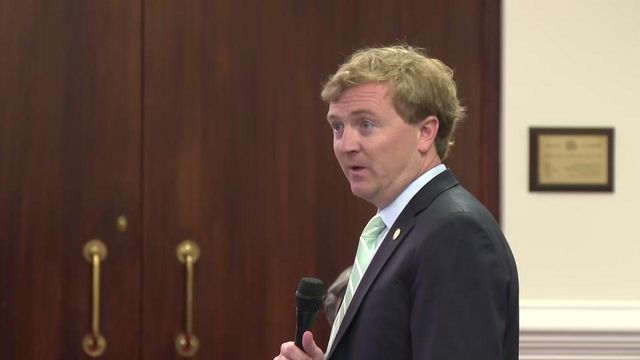NC budget measure would expand 'terrorism exemption' to more state records

Open government advocates say they're concerned about a provision in the state Senate budget that would broaden the so-called "terrorism exemption" and block certain records from public review.
Current state records law already blocks the release of "specific details" of security and infrastructure plans, as well as the release of plans to "prevent or respond to terrorist activity." But the state Senate's budget would add exemptions for documents that detail "patterns or practices associated with executive protection and security," among other measures.
Jonathan Jones, director of the North Carolina Open Government Coalition at Elon University, said the new exemptions could be interpreted to cover more than just records created by the governor's protective detail. Instead, he's worried the exemption could include such documents as the governor's daily schedule or other information that shows where state leaders travel.
{
"name": "sidebar",
"attrs": {
"src": "sidebar-14757846"
},
"children": null
}"The public needs to have an idea of where he's going and what he's doing as it pertains to carrying out the incredible responsibility of governing the state," Jones said. "It's simply not clear language, and I'm not sure what's going to get caught in it."
Two additional provisions would prevent the release of details associated with prison operations and plans by law enforcement "to prevent or respond to criminal, gang or organized illegal activity."
State law already exempts many investigative materials gathered by law enforcement from public release, Jones said, allowing officers to do their jobs.
"There's a reason we give law enforcement room to investigate crime without releasing every detail," he said.
But he argues that, given these existing broad exemptions, further limits are unnecessary and even detrimental.
"I have concerns about making that kind of information exempt from the public record, because we're having a big discussion in society right now about what is the role of police and how do we want our society to be policed," Jones said. "When law enforcement becomes secretive, that really erodes the public's trust."
State Department of Public Safety spokesperson Diana Kees said agency leaders have "sufficient reason" to support the change.
"The Department of Public Safety must be vigilant to counter the threats that are often made against state employees and inmates," Kees said in an email Monday evening. "We must be able to provide security and respond to gang activity to mitigate these threats."
She did not respond to questions about whether a specific threat or incident prompted the expanded exemption.
Calls and emails to state Senate President Pro Tem Phil Berger's office were not returned.
Both the House and the Senate are out of town on summer break until July 13, when they will resume efforts to craft a compromise state budget using versions passed by both chambers.
Multiple agencies employ 'terrorism exemption'
State agencies have occasionally used the terrorism exemption over the last few years to deny access to public records.
In September, Department of Public Safety officials used it to refuse to disclose which law enforcement agencies received weaponry, vehicles and other equipment under a federal military surplus program.
"Providing that information would be providing a lot of information to people who would use it to the detriment of our law enforcement professionals and potentially the public," DPS spokeswoman Pam Walker said at the time. "Simply put, it would be like providing criminals a blueprint on how to harm law enforcement or get around their security tactics when trying to prevent crime and/or a serious event."
Public records lawyers balked at that interpretation, and almost every other state had already released their detailed lists when the federal government began doing it for them in December.
Officials at the state Department of Environment and Natural Resources have also used the state's terrorism exemption to block the release of information about potential fallout from dam breaches from residents downstream.
Jones said one of the issues with new exemptions to public records disclosure is that they can open the door for more interpretation beyond what lawmakers might have reasonably wanted to protect. Agency lawyers, for example, might use a measure preventing the release of plans to "prevent or respond to criminal, gang or organized illegal activity" to keep important law enforcement policies from the public.
"Whether or not that's what was intended, I can guarantee we'll see a police department using that to withhold this information," Jones said.









